Related Research Articles

Antinous, also called Antinoös, was a Greek youth from Bithynia and a favourite and lover of the Roman emperor Hadrian. Following his premature death before his 20th birthday, Antinous was deified on Hadrian's orders, being worshipped in both the Greek East and Latin West, sometimes as a god and sometimes merely as a hero.
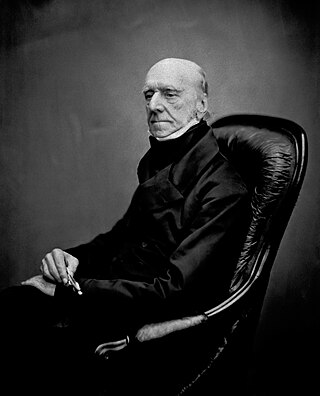
John Disney was an English barrister and antiquarian. He was elected Fellow of the Royal Society in 1832 and Fellow of the Society of Antiquaries in 1839.
Teresa Morgan is an English academic and cleric, best known as the author of Literate Education in the Hellenistic and Roman Worlds and Roman Faith and Christian Faith.
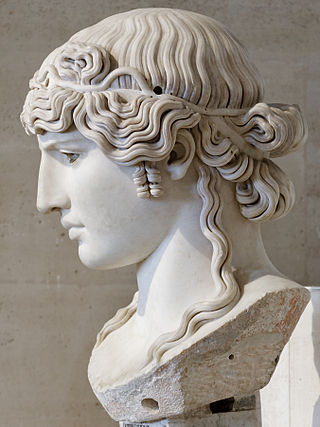
The Antinous Mondragone is a 0.95-metre high marble example of the Mondragone type of the deified Antinous. This colossal head was made sometime in the period between 130 AD to 138 AD and then is believed to have been rediscovered in the early 18th century, near the ruined Roman city, Tusculum. After its rediscovery, it was housed at the Villa Mondragone as a part of the Borghese collection, and in 1807, it was sold to Napoleon Bonaparte; it is now housed in the Louvre in Paris, France.

The Capitoline 'Antinous' is a marble statue of a young nude male found at Hadrian's Villa, Tivoli, during the time when Conte Giuseppe Fede was undertaking the earliest concerted excavations there. It was bought before 1733 by Alessandro Cardinal Albani. To contemporaries it seemed to be the real attraction of his collection. The statue was bought by Pope Clement XII in 1733 and went on to form the nucleus of the Capitoline Museums, Rome, where it remains. The restored left leg and the left arm, with its unexpected rhetorical hand gesture, were provided by Pietro Bracci. In the 18th century it was considered to be one of the most beautiful Roman copies of a Greek statue in the world. It was then thought to represent Hadrian's lover Antinous owing to its fleshy face and physique and downturned look. It was part of the artistic loot taken to Paris under the terms of the Treaty of Tolentino (1797) and remained in Paris 1800–15, when it was returned to Rome after the fall of Napoleon.

The Antinous Farnese is a marble sculptural representation of Antinous that was sculpted between 130 and 137 CE. Antinous was the lover to Roman Emperor Hadrian; the emperor who, after Antinous's death, perpetuated the image of Antinous as a Roman god within the Roman empire. This sculpture is a part of the Roman Imperial style and was sculpted during a revival of Greek culture, initiated by Hadrian's philhellenism. Its found spot and provenance are unknown, but this sculpture is currently a part of the Farnese Collection in the Naples National Archaeological Museum.
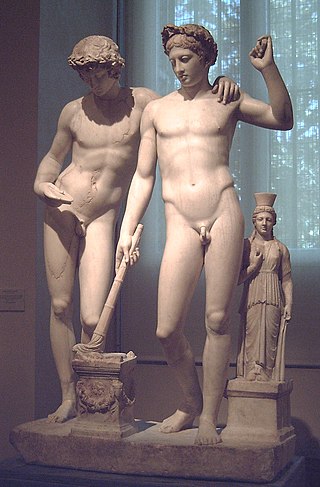
The Castor and Pollux group is an ancient Roman sculptural group of the 1st century AD, now in the Museo del Prado, Madrid.
Edith Hall, is a British scholar of classics, specialising in ancient Greek literature and cultural history, and professor in the Department of Classics and Ancient History at Durham University. She is a Fellow of the British Academy. From 2006 until 2011 she held a Chair at Royal Holloway, University of London, where she founded and directed the Centre for the Reception of Greece and Rome until November 2011. She resigned over a dispute regarding funding for classics after leading a public campaign, which was successful, to prevent cuts to or the closure of the Royal Holloway Classics department. Until 2022, she was a professor at the Department of Classics at King's College London. She also co-founded and is Consultant Director of the Archive of Performances of Greek and Roman Drama at Oxford University, Chair of the Gilbert Murray Trust, and Judge on the Stephen Spender Prize for poetry translation. Her prizewinning doctoral thesis was awarded at Oxford. In 2012 she was awarded a Humboldt Research Prize to study ancient Greek theatre in the Black Sea, and in 2014 she was elected to the Academy of Europe. She lives in Cambridgeshire.
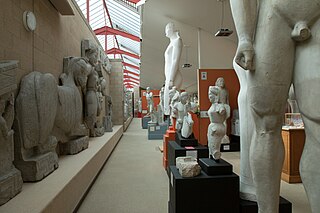
The Museum of Classical Archaeology is a museum in Cambridge, England, housed in the Faculty of Classics of the University of Cambridge. Since 1982, it has been located in a purpose-built gallery on the first floor of the Faculty of Classics on the Sidgwick Site of the university.
Caroline Mary Elam is a British art historian specializing in Florentine architecture, art and patronage in the Renaissance. She has been a senior research fellow at the Warburg Institute in the University of London since 2012.
John Richard "Jaś" Elsner, is a British art historian and classicist, who is Professor of Late Antique Art in the Faculty of Classics at the University of Oxford, Humfry Payne Senior Research Fellow in Classical Archaeology and Art at Corpus Christi College, Oxford, and Visiting Professor of Art History at the University of Chicago. He is mainly known for his work on Roman art, including Late Antiquity and Byzantine art, as well as the historiography of art history, and is a prolific writer on these and other topics. Elsner has been described as "one of the most well-known figures in the field of ancient art history, respected for his notable erudition, extensive range of interests and expertise, his continuing productivity, and above all, for the originality of his mind", and by Shadi Bartsch, a colleague at Chicago, as "the predominant contemporary scholar of the relationship between classical art and ancient subjectivity".

Michael Scott is a British classical scholar, ancient historian, and presenter. He is professor of classics and ancient history at the University of Warwick.

Caroline Jane Goodson is an archaeologist and historian at the University of Cambridge, previously at Birkbeck College, University of London. In 2003 she won the Rome Prize for medieval studies of the American Academy in Rome. In archaeological work, Goodson is most closely associated with the Villa Magna site in Italy where she has been field director since 2006.
Annalisa Marzano, FRHistS FSA, MAE is an Italian-American archaeologist and academic. She is Professor of Classical Archaeology at the University of Bologna and has been Professor of Ancient History at the University of Reading in England. She specializes in Roman social and economic history.

Jane Boyd is a British artist. She is best known for her work in light-based installation and drawing and has been exhibiting internationally since 1986. Boyd was the first woman to be elected Fellow Commoner in Creative Arts, a two-year fellowship (1981–83) awarded by Trinity College, Cambridge. Her work is represented in a number of public collections including the Victoria & Albert Museum, the Gibberd Gallery and the British Museum.
Esther Eidinow is a British ancient historian and academic. She specialises in ancient Greece, particularly ancient Greek religion and magic. She has been Professor of Ancient History at the University of Bristol since 2017.
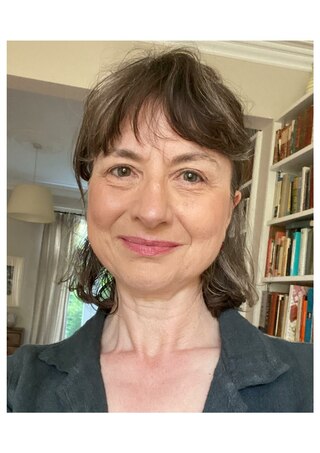
Emily Joanna Gowers, is a British classical scholar. She is Professor of Latin Literature at the University of Cambridge and a Fellow of St John's College, Cambridge. She is an expert on Horace, Augustan literature, and the history of food in the Roman world.
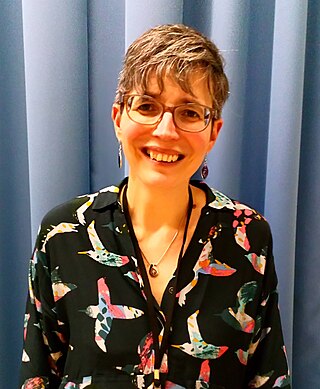
Helen V. Lovatt is Professor of Classics at the University of Nottingham. She is known in particular for her work on Latin epic literature especially from the Flavian period.

Zahra Newby is Professor of Classics and Ancient History at the University of Warwick. She is known in particular for her work on Greek mythology in Roman art and the visual culture of Greek festivals in the Roman east. Newby is currently the Head of the Classics and Ancient History Department at the University of Warwick.
Michael SquireFBA is a British art historian and classicist. He became the Laurence Professor of Classical Archaeology in the University of Cambridge in 2022. He is a Senior Research Fellow at Trinity College, and was elected Fellow of the British Academy in 2022.
References
- ↑ Dr Caroline Vout at Faculty of Classics, University of Cambridge. Accessed 6 February 2016
- ↑ Vout 2012: 1
- ↑ From 'About the author', Vout: 2006
- ↑ Dr Caroline Vout Archived 2012-01-20 at the Wayback Machine at website of Christ's College, Cambridge. Accessed 6 February 2016
- ↑ Greek and Roman Gallery Project Members Archived January 21, 2013, at the Wayback Machine at Fitzwilliam Museum, Cambridge. Accessed 6 February 2016
- ↑ "The shock of the old: what the sculpture of Pan reveals about sex and the Romans". The Guardian , 24 March 2013. Accessed 6 February 2016
- ↑ Art History Newsletter February 2008 Archived May 15, 2012, at the Wayback Machine
- ↑ Philip Leverhulme Prizewinners 2008 Archived 2016-02-06 at the Wayback Machine . Leverhulme Trust, 2008. Accessed 6 February 2016